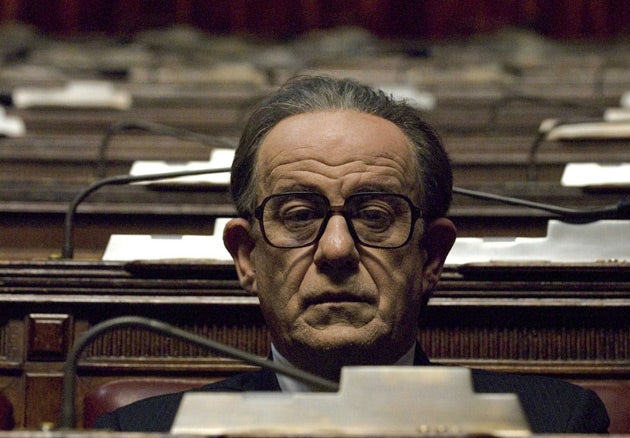Il Divo (15)

Paolo Sorrentino's terrific Il Divo presents an extraordinarily sinister portrait of Giulio Andreotti, Italy's most significant politician of the post-war era.
Seven times prime minister between 1972 and 1992, he faced numerous trials on conspiracy and corruption charges, and always escaped. He was once described, by Mrs Thatcher, as having "a positive aversion to principle" – perhaps she meant it as a compliment. As incarnated by Toni Servillo, Andreotti appears not so much an eminence grise as a black hole, sucking all the light around him into his opaque, unreadable eyes. Hunched and bespectacled, with hands splayed papally across his chest, he seems as poised and watchful as a cobra; the only sign of inner turbulence is his restless nocturnal pacing along the corridors of his home.
Sorrentino, a cool investigator of Italy's dark side (The Consequences of Love, The Family Friend), frames his portrayal within a mosaic of Mafia-related murders – the banker Roberto Calvi, the judge Giovanni Falcone, the journalist Mino Pecorelli – and Andreotti's alleged failure to save Aldo Moro from the Red Brigade. The film accuses by implication, and features one very daring scene in which the prime minister is seen to greet the infamous Cosa Nostra boss Toto Riina with a kiss. In film-making terms it nods casually to Scorsese and Coppola, not just in the lightning flashes of violence but in the snazzy mixture of music (Sibelius, Fauré and Beth Orton) and the swooping, operatic camerawork.
A knowledge of Andreotti's court of toadies and henchmen would help – in one scene they assemble around Andreotti while he's being shaved, like De Niro's Capone in The Untouchables – but it's not essential to one's enjoyment. The man is to all intents and purposes a loner, and even his wife seems barely to know him (he proposed to her in a cemetery, we learn). Stealthy, enigmatic, "Il Divo" eludes explanation, including his own. At one point he rips out the pages of a thriller he's been reading: "The killer was about to be revealed," he says. "I never want to know." In that line may reside the philosophy by which Andreotti governed Italy for so long, and with such impunity.
Join our commenting forum
Join thought-provoking conversations, follow other Independent readers and see their replies
Comments
Bookmark popover
Removed from bookmarks